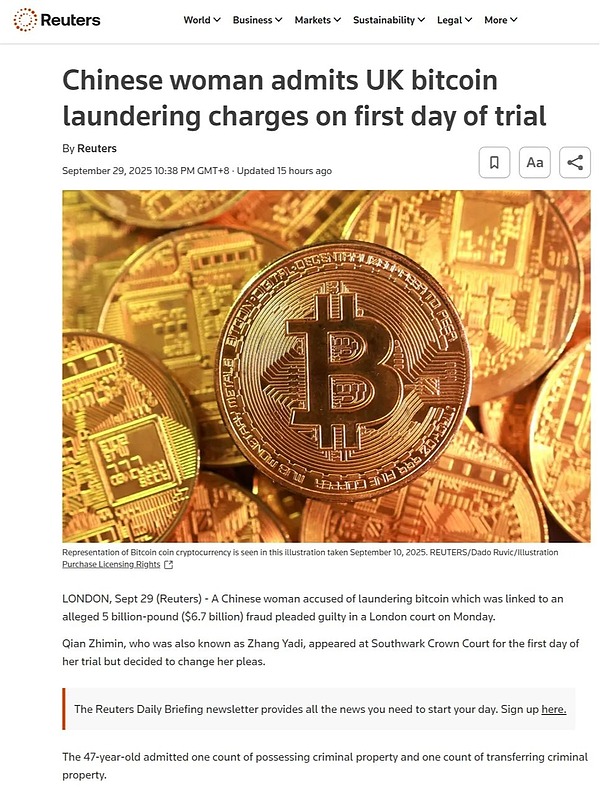This article is for victims of the "Blue Sky Green" case from 2014 to 2017. It explains the case progress and next steps. After reading, please complete the registration form at the end of the article. Manquin Law Firm, in conjunction with its UK partner law firm, will represent you in pursuing your rights to restitution in the UK courts. According to Reuters, Zhimin Qian pleaded guilty at Southwark Crown Court in London on September 29, 2025. She is currently in custody awaiting sentencing. Qian Zhimin's lawyers initially maintained a not guilty defense, but then shifted to a guilty plea. This significant shift is crucial news for victims in China and marks a breakthrough in the international recovery of claims in the Blue Sky Green case. We strongly urge all victims to seize this critical opportunity and complete the claim declaration process as soon as possible. Only by actively asserting your rights can you secure your fair share in the subsequent asset return!

Qian Zhimin pleaded guilty in court: admitting that he was guilty of "possessing criminal property" and "transferring criminal property." Source: Reuters Cases are accelerating into the sentencing phase. According to the UK's Criminal Procedure Rules, once a defendant enters a guilty plea in the Crown Court, the court can directly record a conviction (conviction entered on plea) after confirming the factual basis for the plea, eliminating the need for a full trial of facts and moving to the sentencing phase. In layman's terms, this is equivalent to "skipping a level" in the legal process: a guilty plea eliminates the lengthy and complex evidence presentation and debate between the prosecution and defense regarding the facts of the crime, significantly shortening the overall litigation cycle. The most direct benefit for victims is that the core objectives of asset recovery—the issuance of confiscation and compensation orders by the court—will be implemented more quickly, becoming a powerful tool for protecting victims' rights. The court has the power to issue compensation orders at the sentencing stage. Under the UK Powers of Criminal Courts (Sentencing) Act 2000, after a defendant is convicted, the court has the power to issue a compensation order at sentencing, requiring the defendant to compensate the victim for losses caused by the crime. UK Crown Prosecution Service (CPS) policy also states: "Where a victim has suffered loss, the court may order the defendant to pay compensation." What is a compensation order?
It is a criminal ancillary order, an order in which the court orders the defendant to compensate the victim for the losses caused by the crime;
It is usually issued at the sentencing or ancillary procedure stage. In practice, the court usually arranges a special hearing;
Therefore, although Qian Zhimin’s guilty plea itself will not result in a compensation order, the guilty plea will speed up the sentencing stage, and therefore the compensation order will usually be issued earlier. What is the impact on victims? Qian Zhimin's guilty plea fundamentally changed the nature of the case: 1. It significantly increased the certainty of the outcome: The guilty plea avoided potential trial complications (e.g., protracted disputes between the prosecution and the defense), preventing victims from seeking compensation for a prolonged period and uncertain asset return dates. 2. It significantly accelerated the recovery process: The streamlined procedure resulted in significant time savings. By filing a civil claim in the UK courts and leveraging the forthcoming confiscation and compensation orders as compelling evidence, victims were able to enter the substantive asset recovery negotiation and distribution phase much sooner. 3. Expanded recovery opportunities: The 61,000 frozen Bitcoins were valued at approximately £1.4 billion when they were first seized, but their value has now risen to over £5 billion. This substantial asset has become a focus of both the UK government and Chinese investors. However, recovering the appreciation in Bitcoin's value is much more complex. If the UK courts choose to apply common law, they will need to rely on the principle of "equitable tracing" to prove that the frozen Bitcoins were indeed derived from the victim's initial investment (including any subsequent appreciation). This requires the support of a tracing report issued by a professional organization, such as an accounting firm or blockchain forensics company. If complete tracing evidence is lacking, the court may not adopt the aforementioned principles and instead revert to the Proceeds of Crime Act (POCA) framework, deeming only the principal recoverable. However, it's important to note that even under POCA, a basic chain of evidence demonstrating the flow of funds must be established to prove the relevant assets are indeed proceeds of crime; otherwise, the court will be unable to determine the extent of recovery. Next Steps: Mankiw will collaborate with UK partner firms to conduct one or more representative cases to maximize the interests of the entire victim community. During these proceedings, we will establish victims' ownership claims to specific Bitcoin units. Simultaneously, we will consult with the UK Crown Prosecution Service to prevent the transfer of assets to the state before the representative cases are adjudicated. What should victims do?
Register your information immediately and enter our registration roster;
Register your investment amount and timeline, receiving account information, transfer/transaction information, contracts and receipts, and communication records with the person handling the matter;
If you have ever reported a crime to the police/reported a crime, please provide the receipt or number;
Register your information first if it is incomplete. We will provide you with a list of supplementary materials to complete the list in batches;
 Joy
Joy







